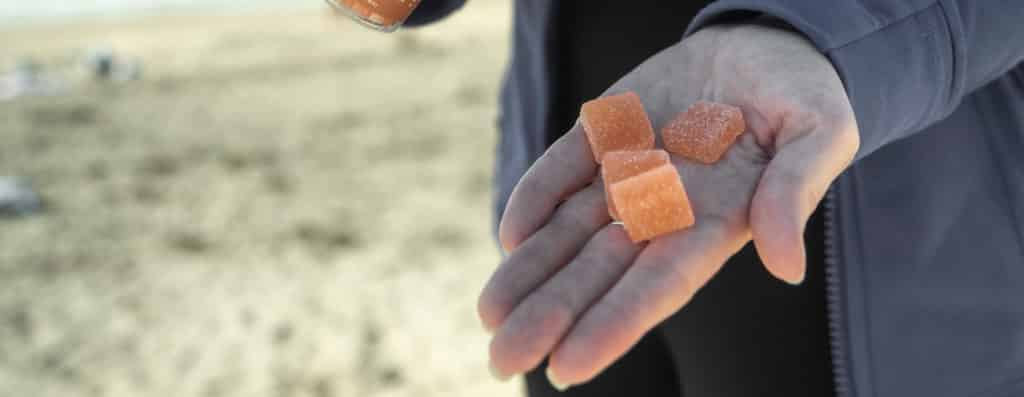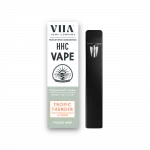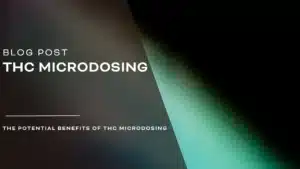
Table of Contents
With hemp-derived cannabinoids sweeping the world, the 2020s are becoming the decade of the cannabinoid! We are learning more and more about the potential effects of cannabis plant compounds and how to isolate them, including some that most people haven’t yet heard of.
HHC is one of the cannabinoids that we are just beginning to research. Though we don’t understand everything yet, one thing seems to be clear: it is worth exploring. Researchers are continuing to learn more about HHC’s potential medical and therapeutic benefits. Some consumers, meanwhile, are even using HHC as THC Alternatives.
We are starting to see HHC products pop up all over the place, from HHC cartridges to gummies, and HHC flower.
So what’s the deal with HHC? And how are HHC Products really legal to sell and consume?
In this article, we’ll explore all these questions to help you know whether HHC might be a good choice for you.
What is HHC?
HHC is the short form for hexahydrocannabinol. HHC can be a natural or synthetic compound, however, since HHC occurs in such trace concentrations in hemp and cannabis plants, synthesizing it through a hydrogenation process allows HHC to be more widely available.
So what does that mean exactly?
HHC is produced through a process that is known as hydrogenation and involves stabilizing the HHC chemical structure by binding it with hydrogen molecules.
But it gets even cooler.
During this process, hydrogen atoms are added to the Delta 9 THC molecule to break its double bond chemical structure. Doing so replaces Delta 9 THC’s structure with hydrogen but keeps its potential benefits and effects.
Hydrogenation alters Delta 9 THC’s structure enough to affect its binding affinity. This means that HHC, like Delta 9 THC, can bind to more of the body’s cannabinoid receptors, as well as TRP pain receptors. In fact, ongoing research has discovered 10 or more hydrogenated THC isomers so far.
And that’s not all.
HHC also gains a stronger molecular structure through hydrogenation. The HHC cannabinoid, therefore, resists oxidation better than Delta 9 THC, letting you store it longer. HHC maintains its potency much longer even if exposed to air, light, or heat (which quickly oxidize Delta 9 THC).
When Detla 9 THC oxidizes, the molecule loses its hydrogen atoms to become cannabinol (CBN). While CBN is also psychoactive, it is only about 10 percent of Delta 9 THC’s potency. Like HHC, CBN is also being studied for potential therapeutic, medicinal, and recreational uses.
Is HHC Legal?
The short answer is that it’s complicated.
In 2018 the amended Farm Bill legalized the cultivation and sale of hemp plants, as well as hemp-derived cannabinoids, and other hemp products – as long as the amount of Delta 9 THC present was 0.3% or below. But these laws never said anything about HHC, Delta 8, or Delta 10 THC.
This leaves the current legal status of HHC products, as well as Delta 8 THC and Delta 9 THC in a seemingly gray area.
One reason that it’s complicated is due to the production process. Some manufacturers claim their HHC products are legal because they are sourced from hemp. Others claim that HHC is a legal compound simply because it is found in hemp. But because the HHC cannabinoid doesn’t occur in high amounts naturally, there is ambiguity. A number of chemicals and processes are used to manufacture it, and these can affect the legality, too.
Is HHC Legal in my state?
The legality of HHC varies widely from state to state. Some states have bans on hemp-derived products, others regulate psychoactive substances, and some don’t regulate it at all. There are even states that don’t allow synthetic THC molecule products – which may even include HHC.
States that HHC is not legal are as follows: Alaska, Arizona, Arkansas, Colorado, Delaware, Idaho, Illinois, Iowa, Kentucky, Mississippi, Montana, New York, Nevada, North Dakota, Utah, and Washington.
HHC Laws in Alaska
HHC is ‘potentially’ illegal in Alaska, even though Recreational and Medical cannabis is legal. The state prohibits hemp-derived THC, THC Isomers (Including Deltas, THC p, THC O).
HHC Laws in Arizona
While recreational cannabis is legal in Arizona, laws specifically prohibit any isomer of Delta 9 THC, which probably includes HHC products as well.
HHC Laws in Arkansas
HHC products are technically illegal since Arkansas does not considers HHC a hemp plant-derived cannabinoid.
HHC Laws in Colorado
HHC is illegal in Colorado since the state specifically prohibits chemically modified THC isomers.
HHC Laws in Delaware
Since THC products and THC isomers are banned in Deltaware, HHC is also probably illegal (but still a gray area).
HHC Laws in Idaho
HHC is explicitly illegal in Idaho, as Idaho considers HHC products a schedule 1 drug.
HHC Laws in Illinois
HHC is illegal in Illinois, as the state recently decided that hemp-derived cannabinoids cannot be used to synthesize intoxicating isomers such as HHC or Delta 8 THC.
HHC Laws in Iowa
Iowa is one of the most restrictive states when it comes to hemp and marijuana laws. Iowa considers all hemp illegal, so we can also assume that HHC products are illegal as well.
HHC Laws in Kentucky
In Kentucky, the state considers all cannabis plant derivatives illegal, explicitly except hemp derived CBD. Meaning HHC is illegal in Kentucky.
HHC Laws in Mississippi
HHC is probably illegal in Mississippi as all forms of THC from the cannabis plant or the hemp plant are considered schedule 1 substances.
HHC Laws in Montana
HHC seems to be illegal in Montana as it prohibits THC and isomers.
HHC Laws in Nevada
HHC is illegal in Nevada, along with other THC isomers like THC P, THC O and Delta 8 THC.
HHC Laws in New York
HHC is technically illegal in New York as the state prohibits THC Isomers.
HHC Laws in North Dakota
HHC is illegal in North Dakota, as the state considers HHC products a controlled substance.
HHC Laws in Utah
HHC products, as well as THC, THO, and Delta 8 THC, are all strictly prohibited.
HHC Laws in North Washington
HHC is illegal in Washington, as the state considers HHC products a controlled substance.
Bottom line: HHC laws in America
The bottom line is that HHC products are a gray area, and will likely stay there until the next amendment of the farm bill comes out.
Even with the 2018 Farm Bill that legalized hemp and hemp products, there are some caveats, however. The DEA (Drug Enforcement Administration) still maintains some regulatory power under the bill, and any synthetically derived THC remains a “Schedule I controlled substance.”
Whether HHC is considered legal will depend on if regulators decide it is a synthetic or natural cannabinoid compound. As of right now, HHC exists in a strange gray area, legally speaking. Make sure you check your state laws before buying HHC gummies, vapes, or other derivatives.
Does HHC Get You High?
So we know that some cannabinoids don’t cause psychoactive effects and are mostly used for their therapeutic benefits. These include CBG, CBD, and CBN.
Others, like HHC, cause a psychoactive high. That means that you are likely to have a change in brain function after consuming HHC, much like THC.
While HHC effects aren’t exactly the same as Delta 9 THC, they are very similar. Bear in mind that you should consider yourself impaired after taking HHC gummies, HHC oil, or HHC Vapes. That means you shouldn’t be driving or going to meet your future in-laws right after.
What is an HHC High Like?
The HHC effects in terms of a high are pretty similar to Delta 9 THC, just slightly weaker.
Like Delta 9 THC or Delta 8 THC, HHC’s effects can be described as psychoactive, with mild euphoria, and even may offer energizing effects.
Users are likely to feel euphoric and relaxed. They may have decreased pain, changes in vision, hearing, and appetite, and a temporarily rapid heart rate.
HHC and Drug Tests
One of the reasons why HHC seems to be the hottest topic on cannabis blogs and forums these days is the rumor that they won’t cause you to fail a drug test.
This seems like an appealing alternative for people who are required to take a drug test in their workplace.
So how much of this is true?
The answer is a bit anticlimactic. You guessed it — we don’t know yet.
There is still very little scientific research on HHC and if it shows positive on drug tests. But we do know that most generic drug test technology is looking for THC metabolites – and the HHC molecule may appear similar.
However, we also have seen on a study all the way back in 1991 that indicated that rodents metabolized HHC in a slightly different way from THC, not producing the main cannabis byproduct detected by most drug tests. However, cross-contamination is likely when it comes to unregulated supplements, and this isn’t enough evidence on its own.
So what’s the bottom line?
More research is needed. Until then, air on the side of caution when taking HHC products if you have to pass a drug scan.
HHC vs THC
Okay, so HHC as we use it is chemically hydrogenated Delta 9 THC. So, what’s the difference?
Firstly, bear in mind that HHC is between 70 to 80 percent as strong as THC. So, while it does have psychoactive effects and is definitely stronger than many cannabis compounds, it isn’t as strong as eating a weed edible or smoking a joint.
Of course, you should also remember that everyone reacts differently to these substances. Tread carefully when you first try HHC products to see exactly how you respond. It’s a good idea to start with a smaller dose and gradually increase until you find out where the sweet spot is.
HHC vs Delta 8 THC
HHC has been compared to Delta 8 THC, the THC derivative that is technically legal under the Farm Act but unregulated by the FDA.
Many users say that the psychoactive high of HHC is roughly similar to that of Delta 8 THC. This makes sense since most Delta 8 THC products are hemp-derived and HHC is about 75 percent as strong as THC.
In terms of strength and body high, the two substances are fairly similar. Some users say that HHC is more relaxing rather than stimulating.
Another similarity?
The legal gray area in which both substances reside.
Is HHC Safe?
This is a tricky question to answer. We’re still learning about HHC effects, so there are few definite answers in terms of the efficacy and safety of the HHC products.
So what do we know so far?
The early studies and anecdotal evidence indicate that, for most people, HHC’s risks are roughly equal to those of Delta 9 THC. This makes sense since the two compounds are so closely related.
The biggest risks seem to be related to taking high doses. People taking HHC might have side effects such as:
- Short or long-term mental health issues – Studies have shown that people who use THC products may experience paranoia, psychosis, or hallucinations. These occasionally may exacerbate long-term mental issues like schizophrenia.
- Dizziness – Some people might feel dizzy after consuming HHC, especially in high doses.
- Rapid heart rate – Many cannabinoids including THC can cause a faster heart rate. This may return to normal after a few minutes.
- Changes in blood pressure – There is some indication that cannabis compounds, including THC, can cause a change in blood pressure, including temporary high or low readings. This can be dangerous for people who are at risk of seizure, heart attack, or stroke. We don’t know if HHC can cause similar effects, but it is worth bearing in mind.
- Sleep issues – Some studies show that regular marijuana users may have problems with sleep, including insomnia and fatigue. However, other cannabinoids such as CBD can help improve sleep, so it is difficult to say how — or if — HHC use will affect this.
- Nausea, vomiting, or diarrhea – Stomach upset is one of the most widely-reported side effects of cannabis use, especially with THC. Some people feel queasy for a short while after consumption, while others may throw up or experience gastrointestinal upset.
One of the biggest concerns of HHC products in terms of safety is that it’s not federally regulated, even if it is hemp-derived. That means that products don’t cross the FDA and might not be labeled correctly, containing much more or less of a compound than is listed.
Always make sure that you source your HHC gummies, HHC vape cartridges, or other products from a reliable company. Start with a lower dosage to gauge your reaction before increasing.
The Best HHC Products

HHC vape products and HHC gummies can both be a great way to consume this up-and-coming cannabinoid.
If you’re interested in trying out HHC Vapes, check out our shop at Viia Hemp Co. We offer two flavors of HHC carts, with blends of HHC, CBD, CBN, CBG, and natural terpenes. Studies have shown that consuming cannabinoids together causes an entourage effect and may have better results than isolated compounds.
Our HHC Vapes include a blend of 85 percent HHC along with these other compounds to result in a moderate, euphoric high.
Most importantly, these HHC vapes help break down exactly what they contain so you know what you’re consuming and what works for you.
Finding the Right HHC Products For You
Science is just at the beginning of learning the ways that HHC products could benefit us. As of right now, the substance is unregulated, so it’s important to tread carefully after you buy HHC. Start small with HHC gummies, HHC vapes, or other substances, until you know the HHC effects and if it’s a good choice for you.






